- Serbia
Get to know Serbia
- Citizens
Culture and science
Health services
Pension and disability insurance
- Business
Employment
Economy
- Media
- Government
- Contact
Keep in touch
Contact form
Back
Keepin touch
Whether you have a question, comment, suggestion or any problem in the purview of the government, send us your message and we will try to respond as soon as possible. If your problem is not in our purview, we will forward your message to the relevant institution.
Q:
A:
EBRD transition report on Serbia positive
London/Belgrade,
25 November 2008
The European Bank for Reconstruction and Development (EBRD) today published its transition report for 2008, according to which Serbia’s average rating for progress in transition has gone up from 2.7 to 2.85, owing to the strengthening of the financial sector and trade liberalization.
The report states that Serbia has made significant progress in regional and European integration and in negotiations with the World Trade Organisation (WTO). Serbia could become a WTO member in 2009.
The EBRD has assessed that even though Serbia has a very high economic growth rate, high inflation and a deficit in the current balance of payments present problems.
Considering the fact that Serbia’s monetary policy is a restrictive one it is necessary to keep public spending under control through the fiscal policy. Serbia’s high economic growth rate will most probably fall in the short term because of the global financial crisis.
Serbia’s economic growth will be reduced by 0.5 percentage points to 7% this year, and be further reduced to 3% in 2009.
According to the EBRD transition report, the high rating is due to Serbia’s great potential, but in the short term lagging behind is inevitable.
Priorities in development plans should be completion of privatisation, improving infrastructure quality and maintenance of macroeconomic stability.
If political stability is maintained, Serbia will probably become very interesting for foreign investors not only because of expected privatization of large companies and infrastructure projects, but also due to the country’s good geographic position.
Especially favourable is the position of Belgrade, which is well linked with other parts of the region.
The key risk to stability is the issue of Kosovo-Metohija, but the Serbian government is expected not to block the economic progress and structural reform.
Privatisation of large companies is going slowly. It is of utmost importance that all tenders and sales are transparent in order to attract good quality investments.
Serbia needs to build infrastructure and is ahead of essential reform in energy, transportation and telecommunications.
The newly established National Council for Infrastructure should set long-term reform priorities, such as efficient and independent regulations and participation of the private sector.
The signing of Stabilisation and Association Agreement and EU accession as well as abolition of ban on export of grains would improve Serbia’s rating in trade and foreign exchange from 3+ to 4-.
Strong growth of financial mediation improved banking rating from 3- to 3 while the rating for infrastructure reform got up from 2 to 2+.
The EBRD has assessed that even though Serbia has a very high economic growth rate, high inflation and a deficit in the current balance of payments present problems.
Considering the fact that Serbia’s monetary policy is a restrictive one it is necessary to keep public spending under control through the fiscal policy. Serbia’s high economic growth rate will most probably fall in the short term because of the global financial crisis.
Serbia’s economic growth will be reduced by 0.5 percentage points to 7% this year, and be further reduced to 3% in 2009.
According to the EBRD transition report, the high rating is due to Serbia’s great potential, but in the short term lagging behind is inevitable.
Priorities in development plans should be completion of privatisation, improving infrastructure quality and maintenance of macroeconomic stability.
If political stability is maintained, Serbia will probably become very interesting for foreign investors not only because of expected privatization of large companies and infrastructure projects, but also due to the country’s good geographic position.
Especially favourable is the position of Belgrade, which is well linked with other parts of the region.
The key risk to stability is the issue of Kosovo-Metohija, but the Serbian government is expected not to block the economic progress and structural reform.
Privatisation of large companies is going slowly. It is of utmost importance that all tenders and sales are transparent in order to attract good quality investments.
Serbia needs to build infrastructure and is ahead of essential reform in energy, transportation and telecommunications.
The newly established National Council for Infrastructure should set long-term reform priorities, such as efficient and independent regulations and participation of the private sector.
The signing of Stabilisation and Association Agreement and EU accession as well as abolition of ban on export of grains would improve Serbia’s rating in trade and foreign exchange from 3+ to 4-.
Strong growth of financial mediation improved banking rating from 3- to 3 while the rating for infrastructure reform got up from 2 to 2+.
-
 Belgrade, 4 January 2026
Belgrade, 4 January 2026Violation of UN Charter has become dominant principle of contemporary politics
-
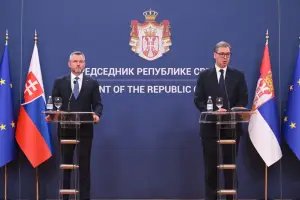 Belgrade, 21 December 2025
Belgrade, 21 December 2025Strengthening cooperation with Slovakia in many areas
-
 Belgrade, 21 December 2025
Belgrade, 21 December 2025President of Slovakia ceremonially welcomed in front of Palace of Serbia
-
 Belgrade, 18 December 2025
Belgrade, 18 December 2025Vučić welcomes President of Georgia in front of Palace of Serbia
-
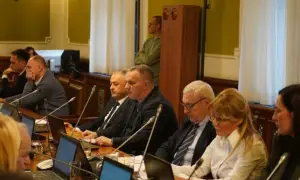 Belgrade, 15 December 2025
Belgrade, 15 December 2025Serbia needs strong, stable education system
-
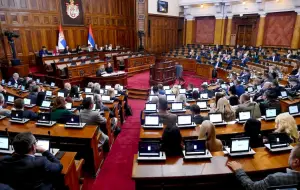 Belgrade, 3 December 2025
Belgrade, 3 December 2025Parliament adopts 2026 budget
-
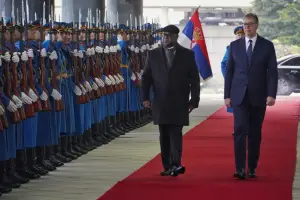 Belgrade, 28 November 2025
Belgrade, 28 November 2025Serbian President welcomes President of DR Congo
-
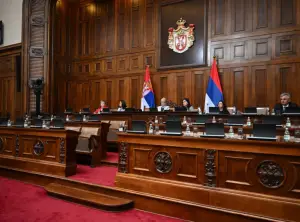 Belgrade, 7 November 2025
Belgrade, 7 November 2025Parliament adopts multiple laws
-
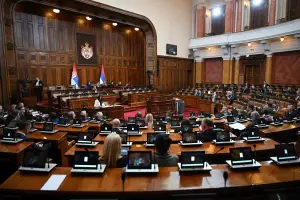 Belgrade, 22 October 2025
Belgrade, 22 October 2025Parliament adopts several laws, ratifies multiple international agreements
-
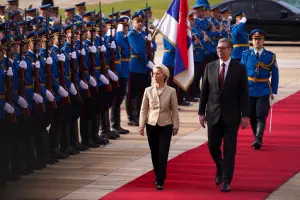 Belgrade, 15 October 2025
Belgrade, 15 October 2025Vučić welcomes Ursula von der Leyen in front of Palace of Serbia
